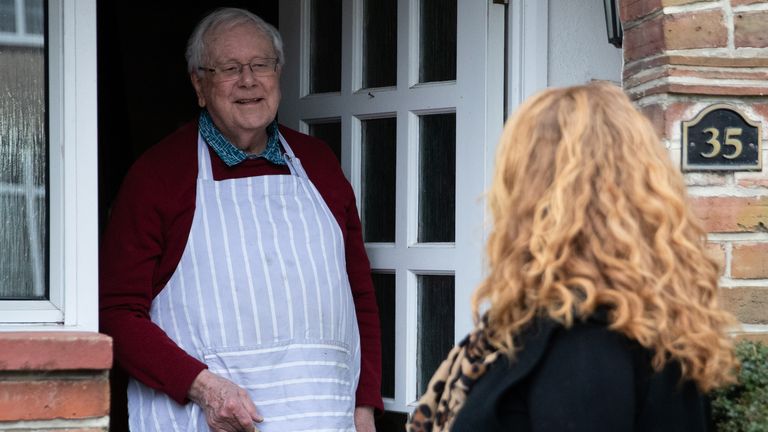Triple lock on pensions will be temporarily scrapped for a year from April
The government is suspending the triple lock on pensions for one year from April 2022, Therese Coffey has announced.
The work and pensions secretary said the state pension will rise by inflation next year to make the system more “fair”.
A surge in wages would have qualified pensioners for a 8% hike in pensions if the rise was based on earnings, Ms Coffey said.
In the Conservative Party’s manifesto it says the state pension must rise by the highest of average earnings, inflation or 2.5% every year.
But Ms Coffey said this will be put on hold next April due to wage anomalies during the coronavirus pandemic.
She added that the move is “fair and reasonable”.
The triple lock is a Conservative manifesto pledge for the five years of the current Parliament and was introduced at the start of the coalition government.
It is a promise that the state pension will increase each year in line with whichever is the highest out of the rising cost of living according to the Consumer Prices Index’s measure of inflation, increasing average wages or 2.5%.
Men and women aged 66 and over are currently entitled to the state pension.
“This year, as restrictions have lifted and we have experienced an irregular statistical spike over the uprating review period, I am clear that another one-year adjustment is needed,” Ms Coffey told MPs as she made a statement in the Commons.
“So tomorrow, I will introduce the Social Security Uprating of Benefits Bill. For 2022/2023 only, it will ensure the basic and new state pensions increase by 2.5% or in line with inflation – which is expected to be the higher figure this year.
“And as happened last year, it will again set aside the earnings element for 2022/23 before being restored for the remainder of this Parliament.
“This will ensure pensioners’ spending power is preserved and protected from higher costs of living but will also ensure that as we are having to make difficult decisions elsewhere across public spending – including public sector pay – pensioners are not unfairly benefitting from a statistical anomaly.
“At a time when we have made tough decisions to restore the public finances which have impacted on working people, such as freezing income tax personal thresholds at current levels, this would not be fair.
“Setting aside the earnings element is temporary and only for one year. This means we can and will apply the triple lock as usual from next year for the remainder of this Parliament in line with our manifesto commitment.”
Shadow work and pensions secretary Jonathan Reynolds called the move “more a triple let down than a triple lock” – referring to the Conservatives’ broken manifesto promises on pensions, taxes and foreign aid.
Earlier on Tuesday, the government set out its plans to break its 2019 manifesto promise not to raise taxes by proposing to raise national Insurance contributions by 1.25 percentage points to pay for an overhaul of the social care system in England.
SNP work and pensions spokesman David Linden, referencing the policy changes on both tax and pensions, told MPs: “Today’s bonanza of manifesto commitments being broken is like nothing we’ve ever seen before – indeed, I don’t think I’ve seen this many U-turns in one day since I sat my driving test back in 2007.
“Not only have the Tories hiked national insurance but now they’re waging war on pensioners’ incomes by watering down the triple lock.”

